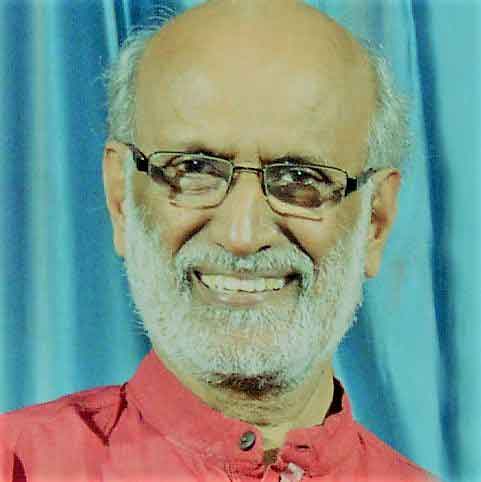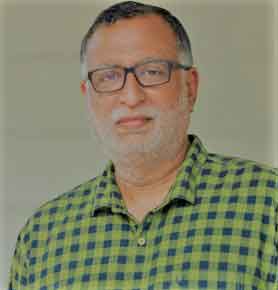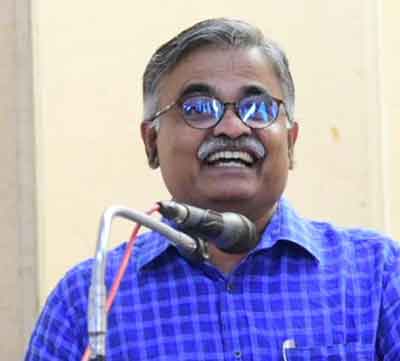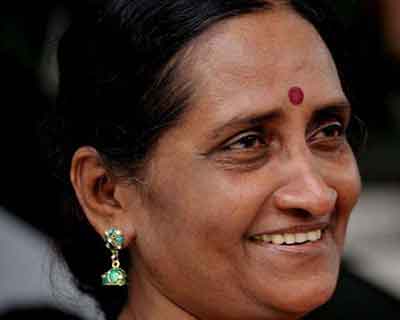
“Even as the surge in COVID-19 cases has sent ominous signals across districts in Kerala, the state and civil society should have shown utmost vigilance in the direction of containing the pandemic,” says Dr B. Ekbal, Chairman, Kerala State Expert Committee on COVID-19 and member, Kerala State Planning Board. He was speaking at a Web-Colloquium on “COVID Keralam: What Next” organised in memory of veteran social scientist and former member of Rajya Sabha, Dr. K. Mathew Kurian by the Inter University Centre for Social Science Research and Extension (IUCSSRE), Mahatma Gandhi University.
Dr Ekbal said that Kerala has proudly set a model for ‘good health with low cost, good health with social justice and equity’ in the country. Though the state has been acclaimed globally for its early preparedness and meticulous precautionary measures, concerns and anxieties have grown apace recently about the super-spread of the coronavirus in the state. If the current trend continues, February will be very crucial for the state, particularly in the background of the forthcoming Assembly elections with the pre-poll activities. It is not reassuring that more than 40 per cent of the caseload reported in the country are from Kerala, besides the state’s high positivity rate. Evidently, the community spread has been caused with the easing of restrictions in the post-lockdown period.
Dr Ekbal pointed out that Kerala with its high density of population, high percentage of the older people and a large number of people with comorbidities is among the riskiest states in India when it comes to COVID-19. Yet, notwithstanding the surge in cases, Kerala was able to sustain low death rate (far below all India level) which shows that the state is in the right direction. He said that this success story can be attributed to the success of its distinctive social capital emerging from its decentralised and vigorous public health care system, its dynamic local governance and its well-informed community engagement. He further pointed out that with the onset of the coronavirus, the state’s primary health centres and district hospitals saw spectacular expansion improvement in infrastructure and funding. This robust health care system also enhanced the morale of the health care personnel to combat the pandemic, Dr Ekbal said.

Dr. K.P. Aravindan, Medical Director of Micro Health Laboratories and former Professor and Head, Dept of Pathology, Govt Medical College, Kozhikode said that there is tendency to downplay the intensity of the COVID-19. We must know that in less than a year, it has taken a heavy toll of two million deaths with more than 100 million infection cases. He said that vaccine is the most effective remedy to combat the pandemic. It was evidently a great achievement to have developed different vaccines in one year. This has been made possible due to the cooperation and collaboration among the world scientific community, as well as among nations in times of the crisis. Yet, there is a big challenge in the availability of sufficient vaccine for the entire population. The question of equitable distribution among the different sections of people is equally problematic. This certainly calls for political will and democratisation at higher levels, Dr Aravindan said.

Dr. Joy Elamon, Director General, KILA said that the local self-governments (LSGs) have played a critical role in the COVID disaster response measures. LSGs could also sustain effective food security infrastructure and even supported migrant workers in this crucial time. However, with the newly elected members in LSGs, we need to offer fresh intense training and planning on an urgent basis to ensure continuity. LSGs also are also expected to step in with new activities and programmes associated with post-COVID management, Dr Elamon said.

Dr. Sabu Thomas, Vice Chancellor, Mahatma Gandhi University inaugurated the colloquium. Dr. A.K Jayasree, Professor and Head, Department of Community Medicine at the Academy of Medical Sciences, Pariyaram chaired the session. IUCSSRE Director Dr. K.M. Seethi welcomed and Dr. Mathew Varghese and others spoke.
Dr. K. Mathew Kurian (1931-1987)
The Annual Memorial Lecture has been instituted as a mark of respect to Dr. K. Mathew Kurian, the Founder-Director of the Indian School of Social Sciences, the Founder-Director of the Indian Institute of Regional Development Studies and the Founder-Editor of Social Scientist. Dr. Kurian had served the faculty of the Delhi St’ Stephens College and the Indian Institute of Foreign Trade (IIFT).
When the EMS Namboodiripad Ministry formed the Kerala State Planning Board (KSPB) in 1967, Dr. Mathew Kurian became the Government’s Economic Advisor and its Member. During the Fourth Five Year Plan (1969-74), Dr. Mathew Kurian was instrumental in formulating and helping finalize an alternative plan for the Fourth Plan. When the State Planning Board organised a major seminar on planning, it was Dr. Mathew Kurian who took the lead. It was based on this that EMS put forward an Alternative Plan Document in response to the Fourth Plan, which was later published by the KSPB under the title Alternative Policies for the Fourth Plan.
Meanwhile Dr. Mathew Kurian played a key role in setting up the Indian School of Social Sciences (ISSS) in 1968. The ISSS began with a major conference on the class character of the Indian State, which was later published by Orient Longman under the title Indian State and Society: A Marxist Perspective (1974). Dr. Mathew Kurian was the Founder-editor of Social Scientist which began its publication in August 1972. Social Scientist is an internationally reputed journal with a successful publication history of 46 years. Prof Prabhat Patnaik has been the editor of the Social Scientist after the tenure of Dr. Mathew Kurian and Dr. Jacob Eapen. The ISSS under the leadership of Dr. Mathew Kurian had undertaken several studies and research with the support of agencies like the Indian Council of Social Science Research (ICSSR).
Dr. Mathew Kurian became a Member of the Rajya Sabha in 1970 representing the CPI(M), and took the lead in voicing the concerns and aspirations of the peasants and the working class in India. Dr. Kurian also set up the Indian Institute of Regional Development Studies (IIRDS) in Kottayam in 1977. He was the Senior Professor and Founder-Director of the IIRDS. Dr. Mathew Kurian was also the ICSSR National Fellow during 1980-83. The Institute also began a quarterly journal State and Society. In 1983, during the death centenary of Karl Marx, Dr. Mathew Kurian organised a major International Conference on Marxist Studies on India. Hundreds of scholars and delegations had come to IIRDS for this mega event and several papers presented in the Conference had appeared in journals and books.
Dr. Mathew Kurian was an inspiration for Marxist-Christian dialogues. He had already come under the influence of Latin American movements and the intellectual trends underway such as the liberation theology. He had organized several seminars and discussions along these lines and one of his notable contributions during this time was his Marxist Interpretation of Salvation. Dr. Mathew Kurian also associated himself with many revolutionary movements and struggles and became a party member (and member of the party fraction in Delhi and Trivandrum). He also served as the President of the factory workers union in Hindustan News Print, Velloor. His publications include Indian State and Society: A Marxian Perspective (Orient Longman 1974), Centre–State Relations (co-editor, Macmillan 1981) and several articles in journals such as Economic and Political Weekly, Social Scientist, India Quarterly, State and Society etc and chapters in edited volumes.
The author is Director, Inter University Centre for Social Science Research and Extension (IUCSSRE), Mahatma Gandhi University, Kerala. He also served as Dean of Social Sciences and Professor of International Relations and Politics, Mahatma Gandhi University. He can be contacted at [email protected]
IF YOU LIKED THE ARTICLE SUPPORT PEOPLE’S JOURNALISM











































